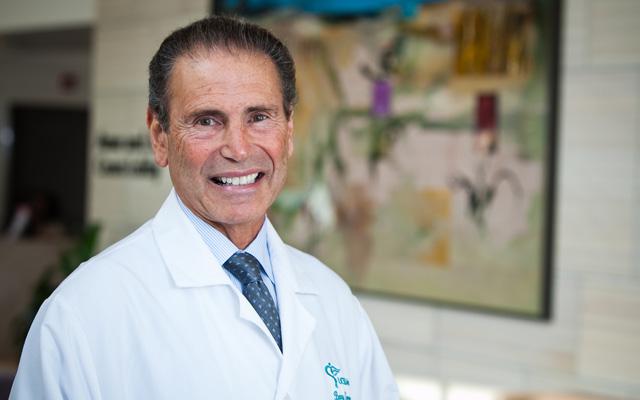Researchers report 17 percent reduction in strokes and heart attacks with low dose blood thinner

Credit: UC San Diego Health
Researchers at University of California San Diego School of Medicine found that using blood thinners in patients with worsening heart failure, coronary artery disease or irregular heart rhythms was associated with a 17 percent reduced risk of thromboembolic events, such as stroke and heart attack.
Results from the COMMANDER Heart Failure trial were published in the April 2019 issue of JAMA Cardiology.
Heart failure, sometimes known as congestive heart failure, occurs when your heart muscle doesn’t effectively pump blood. Certain conditions that narrow arteries, such as coronary artery disease or high blood pressure, gradually weaken or stiffen the heart, reducing its ability to fill and pump efficiently. Researchers say these conditions elevate patients’ risk for subsequent issues.
“We found that 17 percent of patients with heart failure due to not enough blood being pumped out of the heart, coronary artery disease and normal sinus rhythm (the heart’s electrical impulse) experience thromboembolic events. This was more frequent than we had originally thought,” said Barry Greenberg, MD, Distinguished Professor of Medicine at UC San Diego School of Medicine and director of the Advanced Heart Failure Treatment Program at the Cardiovascular Institute at UC San Diego Health.
“We initially wanted to know if we could improve outcomes in patients after an episode of worsening heart failure using a low dose of blood thinner. What we found was that, while this strategy didn’t accomplish that goal, it was associated with a significant reduction in the risk of clinically important events that are caused by thrombosis — stroke, heart attack and sudden cardiac death.”
According to the Centers for Disease Control and Prevention, approximately 610,000 people die of heart disease in the United States annually — that’s one in every four deaths nationwide. Heart disease is the leading cause of death for both men and women.
The international, randomized COMMANDER HF study included 5,022 patients after discharge from a hospital or in treatment in an outpatient clinic for worsening heart failure. Patients were given 2.5 milligrams of rivaroxaban (a blood thinner marketed as Xarelto) orally twice daily or a placebo in addition to their standard therapy.
“Although there was some increase in bleeding risk with low-dose rivaroxaban, major bleeding, which was the primary safety endpoint of the study, was not significantly increased,” said Greenberg. “This is an important observation because currently there is no mandate in place for physicians to prescribe blood thinners to this patient population.”
Researchers say future steps include confirmation of findings in prospective, large clinical trials.
###
Co-authors include: James Neaton, University of Minnesota; Stefan Anker, Universitatsmedizin Berlin; William Byra, Hslaowel Deng, David La Police, Christopher Nessel, Catherine Vanden Boom, Janssen Research and Development; John Cleland, University of Glasgow and Imperial College of London; Carolyn Lam, Duke-National University of Singapore and University of Groningen; Mandeep Mehra, Harvard Medical School; Theodore Spiro, Research and Development, Pharmaceuticals, Thrombosis and Hematology Therapeutic Area; Dirk van Veldhulsen, University of Groningen; Falez Zannad, Universite de Lorraine and Universitaire de Nancy; and Min Fu, Imperial College London.
Disclosure: Greenberg is a paid member of the COMMANDER Heart Failure Trial steering committee and provides consulting services. See full study for more industry affiliations.
Media Contact
Michelle Brubaker
[email protected]




